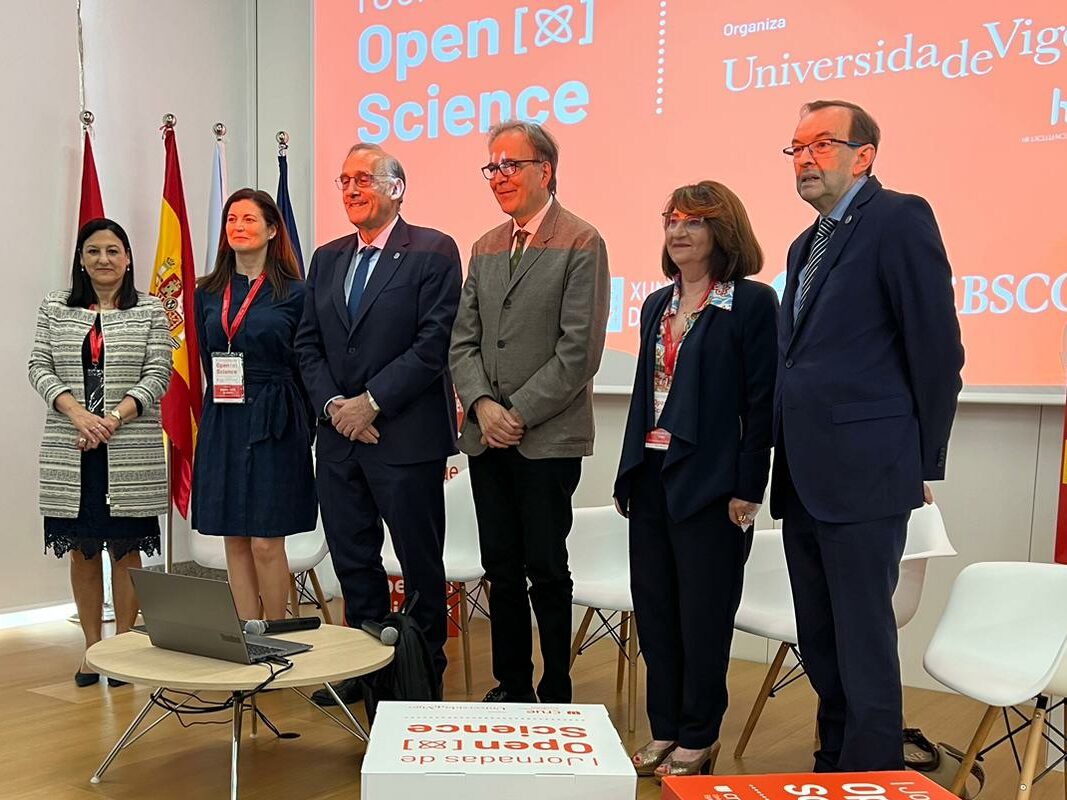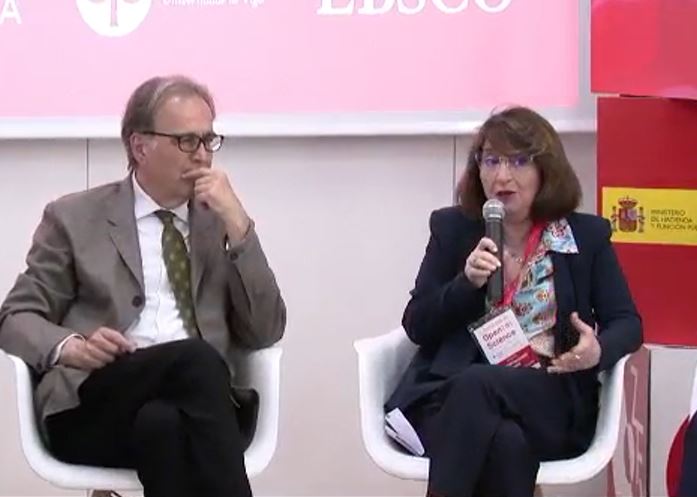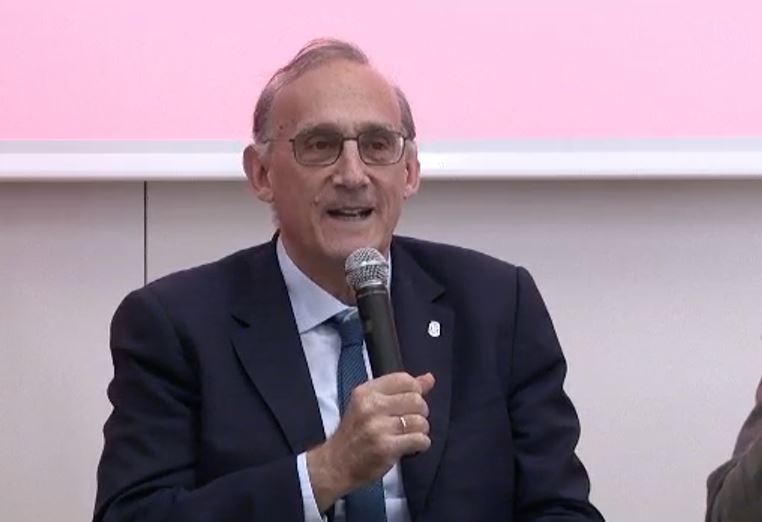
Vigo, June 2, 2023. The President of Crue’s Open Science Commission and Rector of the Universidad de Alicante, Amparo Navarro, together with the rector of the host institution Universidade de Vigo, Manuel Reigosa, inaugurated Crue’s 1st Open Science Conference this Thursday, 1 June. During the presentation, they highlighted the commitment of Spanish universities to Open Science, exemplified by the Plataforma Transversal de Impulso a la Ciencia Abierta (Platica), a project promoted by Crue and aimed at developing a transversal platform that will help support Open Science. The event was also attended by the Minister for Universities, Joan Subirats; the Secretary General for Research, Raquel Yotti, and the Secretary General for Universities of the Xunta de Galicia, José Alberto Díez de Castro.
Prof. Rector Navarro stressed the importance of ‘promoting free and open access to the results of scientific research and the data it generates, with the aim of promoting transparency, cooperation and innovation’. She acknowledged the work done to present the Platica project at this first conference, initiative in which Crue collaborates with RedIris. Amparo Navarro explained that ‘the aim is to create an open science environment in Spain that integrates different tools to support research staff in the dissemination of the concept of Open Science, the management and publication of research data and the updated and detailed monitoring of the development of Open Science in our country’.

Rector Navarro also briefly assessed the European research assessment framework, highlighting the reform process supported by the European Union and promoted by more than 500 European organisations, including Crue and many Spanish universities, through CoARA (the Coalition for Advancing Research Assessment). In this regard, Navarro stated that universities are aware that they must ‘move towards Open Science and towards holistic and dynamic approaches that seek a more qualitative assessment, with indicators increasingly focused on innovative publications and less on the number of publications’ and described this reform as ‘a brave and necessary commitment’. For the same reason, Crue –together with ANECA and CSIC– promotes the creation of a Spanish Chapter within CoARA, a space for meeting and mutual learning of all those Spanish entities interested in working in this direction.
For his part, Rector Manuel Reigosa emphasised the importance of the existence of an Open Science strategy at national level and thanked the Spanish Ministry of Science and Innovation for its approval. He explained that ‘this strategy, together with the plan for all universities led by Crue through the Platica project, will allow us to move forward together in the right direction’ and that ‘Open Science is one of the objectives of the strategic plan’ of his university, in line with the new guidelines set by the recently passed Spanish University Law LOSU and the amendments to the Spanish Law on Science. This ‘will help to promote equality and justice in scientific research’, he added.

Reigosa insisted that open access to research results ‘could help to improve the quality of research’ and specified that ‘fostering collaboration between researchers from different disciplines can help find solutions to complex problems that might otherwise have been difficult to address’. However, he warned that ‘in the current state of open science, this still has limitations, such as payment to publishers, protection of personal data and/or intellectual property’, challenges which, he said, will be addressed during the conference.
During these two days, experts will share their knowledge and experiences on Open Science and analyse the latest trends. The agenda of the conference also includes talks, roundtables, and practical workshops in which topics such as the recently approved National Open Science Strategy and the guidelines in this field reflected in the LOSU and the Law on Science and Technology, as well as the dynamics in the rest of Europe, data management, open access publication and research assessment, among others, will be discussed.
Committment to Open Science
Crue Spanish Universities approved the declaration «University Commitments to Open Science» in 2019, which includes the following ten specific actions to promote Open Science:
- Analysing the status of Open Access in Spain and monitoring its evolution so the available information is always up to date.
- Collecting and making public the expenditure of universities on accessing electronic information resources, as well as publishing results. Moreover, analysing any changes in expenditure that universities would incur when moving from the current system of access through payment to a system of immediate Open Access.
- Including immediate Open Access in any negotiation with editors of scientific publications, while promoting the payment of an equitable price that in no circumstances should imply an expenditure greater than the current one, making the system of scientific communication sustainable.
- Promoting a cultural change in the R & D system agents through awareness and training in Open Science, as well as promoting ethical behaviour in research.
- Exploring ways of encouraging the implementation of Open Science through evaluation and recognition models different from the current ones for researchers, units, and projects. For this purpose, creating a specialised group, formed by representatives of Spanish Universities’ Crue and of agents that are part of the state evaluation system, with the task of developing and promoting the implementation of more comprehensive indicators, both quantitative, based on publication impact indices, and qualitative, allowing for the incorporation of multiple criteria beyond the purely bibliometric and an analysis of the potential impacts of their use.
- Implementing systems of incentives and recognition within universities that are in line with the aims of Open Science and that entail the modification of the current criteria used in the evaluation of researchers, units, and projects.
- Promoting collaboration with the relevant national entities to establish a national infrastructure, shared by universities and research centres, and integrated into EOSC, for the storage, management, and publication of scientific data from thematic areas not covered by European infrastructures already integrated into EOSC.
- Follow the principles of the EOSC Declaration of October 2017 to show Crue’s support for the initiative and for the principles of Open Science that underlie it, and to encourage active participation in its stakeholder forum.
- To consolidate a cross-sectoral working group on Open Science within Crue that, in coordination with any state administration or initiative, analyses and monitors its implementation in Spanish universities.
- Making Crue’s presence effective in national and international forums where different alternatives are being evaluated for implementing Open Science.
Open Science is characterised by the openness not only of publications (Open Access), but also of research data, methodologies, processes, and the involvement of citizens in an environment of responsible research and innovation. In short, it is about making the results of publicly funded research accessible in digital format for the scientific community that produces them, as well as for the society in general that funds them, promoting the reproducibility of science and the reuse of the results.

